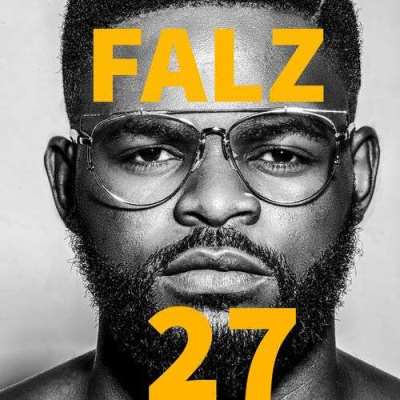Falz‘ gimmickry on the microphone is a gift and a curse – on the one hand, it makes his flavor of hip-hop down to earth and relatable, but on the other hand, it has masked his genius and robbed him of the kind of critical acclaim that his rap talent obviously deserves.
What Falz does with everyday words to a beat is an art, how he makes serious social commentary sound like fun is a talent, and how he has remained so consistent doing these and more over a period of time is something worth studying.
Falz may make us chuckle from time to time but the career he has been able to build, after breaking out doing funny skits on Instagram, is nothing to be laughed at. So from the gate, this 27 album feels like Falz is coming for what is rightly his, his respect. On the album’s opener “Polished”, he switches between a convincing British accent, and his trademark faux-Ibadan chatter, all the while dropping commanding bars. There’s a renewed determination on “Polished” that plays directly into the need for rappers to continually prove themselves. Falz strongly obliges, with some upper echelon, self-hailing rapping. It also helps that the Sess-helmed trap beat bangs with the force of Dwayne Johnson handling a battering ram – talk about emphasis.
Just like its opener, 27 feels like an album based on emphasizing Falz and his capabilities, displaying strengths and tucking out a few weaknesses.
The motivation on 27 feels renewed, because not only is Falz good at rapping, he is passionate about making music. “I Do It” is a loose collection of the things and people that drive him and hence, could be considered the emotional centerpiece in an otherwise scattered project. The hard-hitting electronic beat trudges along like it was created for a cypher, and Falz rolls out his reasons and desires for making music, ranging from the vapid (IG likes and groupies), to the substantial (for friends and family) and the dreamy (winning a Grammy).
But beyond a few lines on “I Do It,” there are barely any other spots on 27 that tackle the man behind the public persona. You won’t come out of the album with a wider knowledge of Folarin Falana, it’s a Falz affair all through.
A pleasant surprise is Falz’ apparently solid French speaking and accent – I have little knowledge of French, but he sounds convincing and a well-versed friend seems impressed. Although not in short supply throughout 27, the luxurious, chest-pounding bragging on both “La Fete” and “Je Vrai Bhad Guy” gets embellished because of the infusion of lyrics in French. Both songs are rooted in electronic music, but “La Fete” is substantially melded with Afro-pop to make it more rhythmic and a better candidate for the semi-obvious crossover grab into neighboring Francophone countries.
Sourcing around for varying entertaining sounds that fit into the musical zeitgeist is Falz’ trusted strategy and it’s no different on 27. While it buoys his tightrope walk between commercially-inclined music and content-filled lyrics, it often leads to cluttered transitioning between tracks. Variety may be the spice of life, but too much spice spoils the recipe. By flying on a wide range of sonic carpets, 27 becomes a bumpy project that barely ever settles into a groove by riding different waves.
Even with its flailing run and some duds (“Alright” “The Lamba Song”), there’s really no overly repulsive songs on 27. Falz’ capability as an entertaining and engaging lyricist does a lot of heavy lifting. But without a compelling stretch and his inability to rein it in early (17 songs is a lot), 27 suffers from the lag.
Constant shotgun rider, Sess assists sizably on production, and frequent collaborators, Studio Magic, also chip in significantly. An outsourced standout cut “Get Me,” is produced by Juls who effectively employs his trademark groovy minimalist sound. Piano keys and guitars licks vibrate and ripple, with low-key percussions for propulsion while Falz narrates a night of getting way too high off alcohol and drug use due to peer pressure. As is the norm with Falz, the storytelling is excellent and feels authentic, addressing a social issue without any laboring signs.
Another brilliant cut, albeit being socially conscious, is the Sir Dauda featuring “Confirm”. On the song, Falz puts online fraudsters and internet bullies (Oh! Hey there, Hushpuppi) on blast over a folksy, slow-rolling beat. There’s also the impressive combo with Ycee on the pre-released “Something Light” where both rappers run the pick-and-roll in tackling female gluttony and hypocrisy with comic ease.
“Child Of The World” is a more emotionally weighty track where Falz constantly moves between different POV’s to poignantly tell a tale of desolation and foreshadowing hope. The soulful, yet melancholic, production perfectly accentuates the grim and subtly hopefully nature of track which rolls sexual abuse, rape and prostitution into a tear duct wrestling song.
At his best, Falz combines entertaining with lyrical profundity – be it exploring vacuous or substantial themes. While not without flaws, Falz’ 27 combines both attributes quite well to warrant attention and a collective thumbs up. So in addition to all the reverence that comes with a new age, this album should also bring Falz closer to the kind of respect he deserves from the hip-hop community at large.


